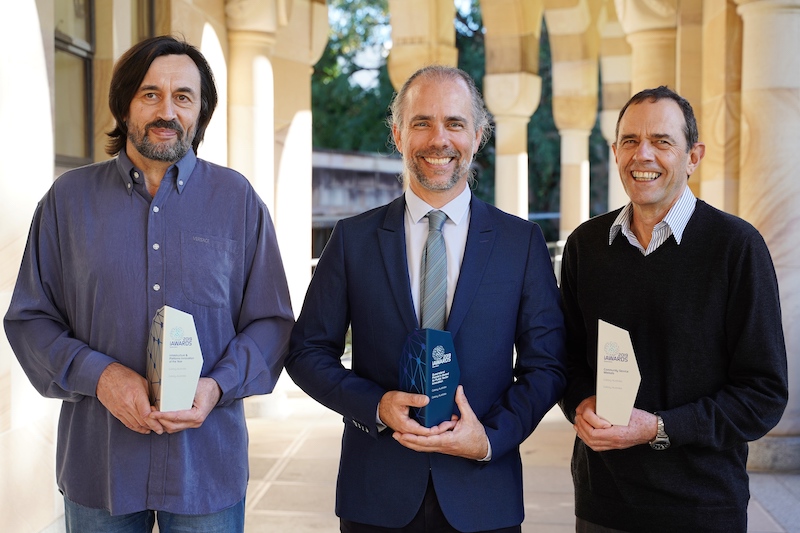
RCC this year has been proud to introduce a handful of major research computing infrastructure projects to the UQ community.
We’ve been thrilled to receive a few awards this year too.
Mid-2019, RCC installed new data storage technology for UQ that should save researchers time and money. Zero Watt Storage is able to house large volumes of data on disk drives, without the high operational costs usually associated with hard-drive based storage devices.
Released in August, RCC developed a new framework to make it easier for researchers who use digital instruments to manage and analyse their data. The new framework, CAMERA, will facilitate the CApture, ManagEment, stoRage and Analysis of data from microscopes, scanners and sequencers.
RCC also worked hard this year on improving Wiener, a UQ high-performance computer for research involving imaging-intensive science, artificial intelligence and machine learning.
Wiener became UQ's first petaflop-capable HPC, thanks to first-to-market IT hardware that RCC installed earlier this year.
In mid-2019, RCC, in conjunction with Intel and Dell, added a dedicated Field Programmable Gate Array (FPGA) accelerated computing platform to Wiener for specialised workloads at UQ.
Researchers who would most benefit from using an FPGA include those using bioinformatics, cybersecurity research frameworks, medical imaging, voice recognition, cryptography, digital signal processing, device controllers, software-defined radio, random logic, ASIC prototyping, computer hardware emulation, integrating multiple SPLDs, filtering, communication encoding, and more.
The other project RCC staff worked up a sweat over this year, was improving UQ’s MeDiCI data storage fabric, including its successful extension to James Cook University. MeDiCI enables the seamless and ultra-fast transfer of data between caches at JCU, UQ and offsite data centres, so researchers do not need to manually transfer data. UQ and JCU researchers working together should find it much easier to share data now that MeDiCI is operating at both universities.
Also enabling faster data transfers at UQ is AARNet. UQ was the first university in Australia to go live earlier this year with a dual 100 gigabit per second (Gbps) connection to AARNet, Australia’s national not-for-profit high-speed network for research and education. This is a tenfold increase in data transfer capacity and speed for UQ.
In other pleasing news, RCC won a few awards this year. First up was bioinformatics platform Galaxy Australia winning three trophies at the Australian Information Industry Association’s (AIIA) Queensland state iAwards in June, including the top prize, the Queensland Premier's iAward for Public Sector Innovation. RCC, QCIF and its bioinformatics arm QFAB, together with the University of Melbourne’s Melbourne Bioinformatics, jointly built and operate Galaxy Australia.
And just last month, RCC Director Professor David Abramson received the 2019 Pearcey Medal, a lifetime achievement award for his contribution to Australia’s information and communications technology industry.
Another big win for RCC this year was having Jake Carroll join the team as RCC’s new Chief Technology Officer. The move comes after many years of collaboration between Jake and RCC staff. Jake has worked in senior IT management positions within UQ for the last ten years.
We also welcomed three other new staff to RCC this year: HPC and Linux specialist Ashley Wright joined RCC as a senior systems administrator; and software developer Alvin Sebastian and developer analyst Jonathan Hadwen joined the team to support the digital humanities and social sciences projects that RCC is involved in.
Prof. Abramson said staff have enjoyed working with key stakeholders in seeing RCC’s system and solutions advancing research at UQ.
“As in the past, we finish the year on both a high for what we have achieved, and somewhat exhausted by the pace,” he said.
“2020 will be no less frenetic. We expect a major enhancement of the MeDiCI data fabric, including additional storage to meet the growing demand. At the same time, we will launch a series of procurements for new supercomputing capability, to be rolled out progressively over the next three years. We will also see enhancement to the major platforms we run, including OMERO, the Characterisation Virtual Lab (CVL), XNAT, CoESRA and Galaxy Australia.
“I was delighted to attend the new RCC User Reference Group meeting the other day to take advice from our core users on how we can improve the service even more. I look forward to both their tactical and strategic advice.”



